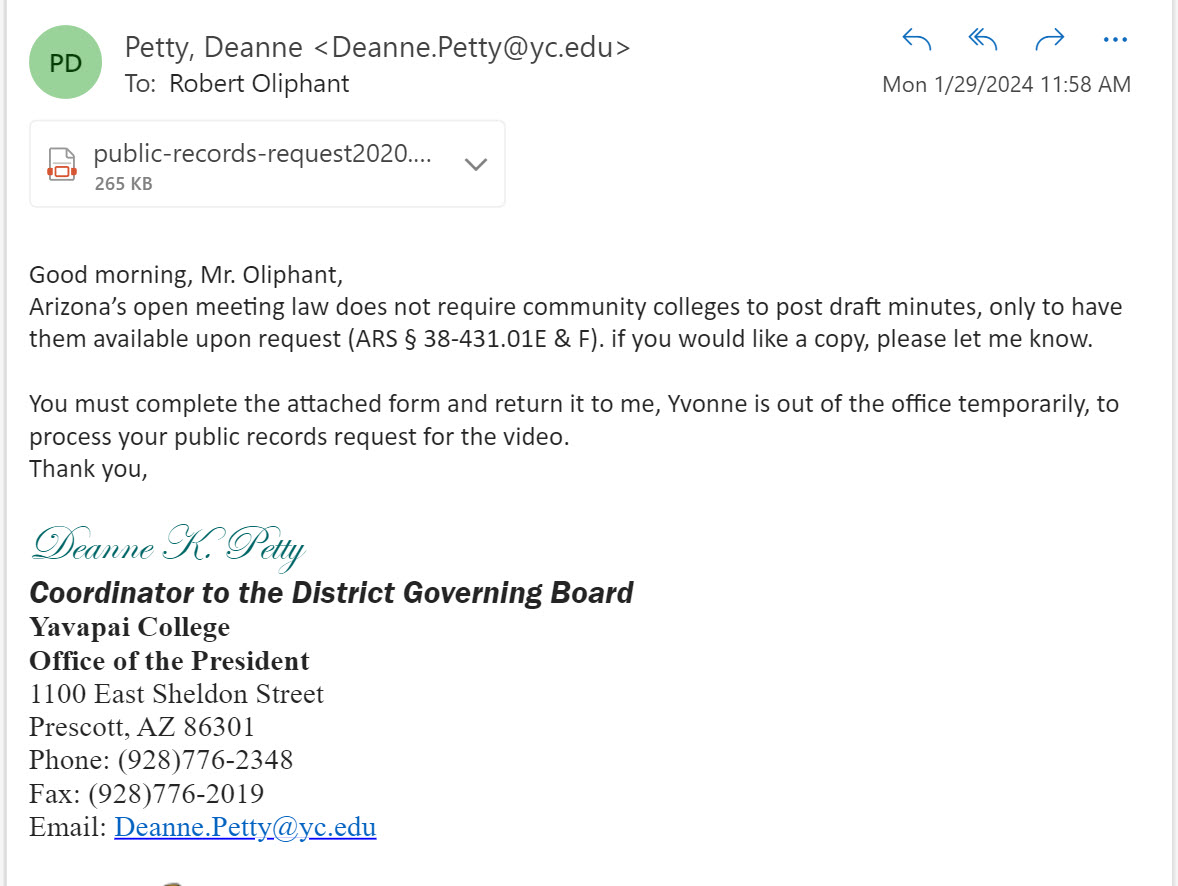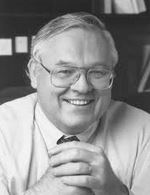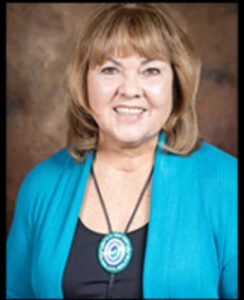Archive for GOVERNING BOARD
EFFECTIVE NEXT FALL, YAVAPAI COMMUNITY COLLEGE GOVERNING BOARD WILL NO LONGER HOLD MEETINGS IN SEDONA, CHINO VALLEY, OR PRESCOTT VALLEY
By R. Oliphant
Sunday,
March
24th,
2024
Categories : GOVERNING BOARD
YAVAPAI COMMUNITY COLLEGE RETURNS TO DECADE-LONG PRACTICE OF POSTING VIDEOS OF GOVERNING BOARD MEETINGS ON ITS WEBSITE
By R. Oliphant
Wednesday,
February
21st,
2024
Although no notice was given on the agenda (or elsewhere), that the February 20 meeting was going to be live-streamed, it was. Moreover, it was re-posted to YouTube a day later for those who didn’t know about the change. Finally, a copy of the February 13 workshop meeting was posted on the District Governing Board website. Thanks to Ray Sigafoos and the Board for standing up for transparency in government!
 Yavapai Community College began live-streaming District Governing Board meetings on the College’s YouTube channel on February 20. This decision was made without any prior notice in the posted February 20 agenda or elsewhere to the public. The positive aspect is that, along with live-streaming, the meeting was posted on YouTube on February 21 for those interested in viewing it.
Yavapai Community College began live-streaming District Governing Board meetings on the College’s YouTube channel on February 20. This decision was made without any prior notice in the posted February 20 agenda or elsewhere to the public. The positive aspect is that, along with live-streaming, the meeting was posted on YouTube on February 21 for those interested in viewing it.
Moreover, the video of the February 13, 2024 Workshop was made available on the District Governing Board website on February 21, allowing Yavapai County residents access to both meetings—one on YouTube, the other on the District Governing Board website.
Recall the decade-long practice of regularly posting videos of District Governing Board meetings was strongly opposed by Community College President Dr. Lisa Rhine. The withholding of regularly posting videos of Board meetings occurred, apparently at her direction, suddenly with the January 2024 meeting. This abrupt decision to block transparency of the Governing Board discussions, which had been followed for a decade or more, triggered major concern among County residents.
Credit is due to District Governing Board member Ray Sigafoos for raising this matter and persuading the Board to vote in favor of making the videos accessible to the public they serve. Kudos to Mr. Sigafoos, who is sometimes considered by some as a kind of grumpy old . . . (fellow).
Additionally, gratitude is owed to all citizens who voiced their opinions to the College regarding College President Dr. Lisa Rhine’s stance that videos of Governing Board meetings should not be easily accessible to County residents. After all, it is these citizens who contribute over 75% of the unrestricted revenue via property taxes to operate the Community College. Thank you for your concern!
Categories : GOVERNING BOARD
YAVAPAI COMMUNITY COLLEGE GOVERNING BOARD PULLS SHROUD OVER DRAFT BOARD MINUTES AND VIDEO TAPE OF MEETINGS
By R. Oliphant
Thursday,
February
1st,
2024
After decades, Board puts an end to the enlightened view that Board activities should be fully transparent to the County taxpayers
 After decades of openness, the Yavapai Community College District Governing Board has made a sudden shift in its approach to transparency. The Board now requires anyone seeking draft minutes of a meeting to follow the formal process outlined by Arizona’s Public Records Act. This marks a significant departure from the Board’s decades-long policy of readily providing such information by promptly posting it on its website. Furthermore, the Board has discontinued the practice of making videotapes of meetings available within three business days, if ever. This change appears to stem from concerns that the videotapes were fostering excessive accountability and transparency, elements the Board now is eager to avoid.
After decades of openness, the Yavapai Community College District Governing Board has made a sudden shift in its approach to transparency. The Board now requires anyone seeking draft minutes of a meeting to follow the formal process outlined by Arizona’s Public Records Act. This marks a significant departure from the Board’s decades-long policy of readily providing such information by promptly posting it on its website. Furthermore, the Board has discontinued the practice of making videotapes of meetings available within three business days, if ever. This change appears to stem from concerns that the videotapes were fostering excessive accountability and transparency, elements the Board now is eager to avoid.
This retreat from openness may be driven by fears over what residents of Yavapai County might discover about the Board’s actions. For instance, during the January 16, 2024, meeting, there was allegedly an incident involving some Board members making remarks about a Prescott woman, which triggered a kerfuffle of sorts with the Board attorney over the remarks. 
The College has informed the Blog that it will not post a draft of the minutes from the January 16th Governing Board meeting without a formal Public Records request. This move seems designed to make accessing the draft minutes as difficult and obscure as possible. Moreover, the College is also neglecting the Blog’s request for an unedited copy of the video recording of the January 16 meeting, despite a formal public records request being made for it.
Below is the letter from the College telling the Blog it must make a formal statutory request using the College’s form if it wants to see a draft of the minutes (while ignoring the request for the videotape made by the Blog).

Categories : GOVERNING BOARD
DISTRICT GOVERNING BOARD HASTILY CALLS FOR SECRET EXECUTIVE MEETING DECEMBER 14 TO AGAIN DISCUSS POTENTIAL LEASE AND/OR PURCHASE OF REAL PROPERTY, OR PROPERTIES, IN PRESCOTT
By R. Oliphant
Friday,
December
15th,
2023
Residents remain in the dark about the specific property under consideration, shrouded by the cloak of these closed-door meetings
 Yavapai Community College’s District Governing Board was hastily called into a one-hour secret executive meeting on Thursday, December 14 to discuss and consult “with College Representatives Regarding Potential Lease and/or Purchase of Real Property, or Properties, in Prescott.”
Yavapai Community College’s District Governing Board was hastily called into a one-hour secret executive meeting on Thursday, December 14 to discuss and consult “with College Representatives Regarding Potential Lease and/or Purchase of Real Property, or Properties, in Prescott.”
The December meeting came on the heals of another long secret executive meeting held on the Verde Campus just three weeks ago on November 26. The purpose of that secret meeting was to discuss and consult “with College Representatives Regarding Potential Lease and/or Purchase of Real Property, or Properties, in Prescott.”
Residents of the county remain in the dark about the specific property under consideration, shrouded by the cloak of these closed-door meetings. The next public Board meeting, offering the first potential glimpse into the Board’s plans, is ten weeks away, scheduled for February 20th.
Categories : GOVERNING BOARD, Secret meetings
NOTE: DISTRICT GOVERNING BOARD MEMBERS HOLD HOLIDAY DINNER FOR THEMSELVES ON DECEMBER 6 IN PRESCOTT
By R. Oliphant
Saturday,
December
9th,
2023
No business transacted
A holiday dinner party was held for the five members of the Yavapai Community College District Governing Board on Wednesday, December 6 at Murphy’s Restaurant in Prescott. No business was transacted during the dinner. The public was not invited.
Categories : GOVERNING BOARD
GOVERNING BOARD MEETS IN SECRET EXECUTIVE SESSION TO SET GOALS FOR COMMUNITY COLLEGE PRESIDENT BUT REFUSES TO INFORM COUNTY RESIDENTS OF THOSE GOALS FOLLOWING SECRET MEETING
By R. Oliphant
Saturday,
September
23rd,
2023
Only information provided County residents after Tuesday’s meeting was a Board motion stating that it “accepts the goals” it set during the secret meeting

Robert Oliphant, Editor
EDITORIAL: In the shadows of secrecy, the Yavapai Community College District Governing Board met on Tuesday, September 19, 2023, with a significant agenda item—establishing goals for Dr. Rhine in the upcoming academic year. The veil of confidentiality shrouding the meeting would be comical except for its importance to County residents.
Following the closed-door secret executive session, a motion was passed, stating, “We accept the goals that we all set for Dr. Rhine and look forward to a prosperous 2023-2024.” A harmless statement concealing a disquieting truth about what was actually decided..
It is of concern that there was a total absence of any prior discussion about setting goals in the public domain. It is as if the residents of Yavapai County have been left in the dark, their curiosity about the health of the College and the goals set for the College’s chief executive is being met by the Governing Board with a resounding silence. The secrecy that surrounds these objectives denies County taxpayers any insight into the very essence of their Community College’s aspirations for the coming year.
The consequences of this secrecy extend beyond mere curiosity. It fundamentally undermines the principles of transparency and accountability that should be the bedrock of any publicly funded educational institution. Without knowledge of the goals established, residents are rendered impotent in their ability to assess the achievements and progress of Dr. Rhine as the College’s president.
In essence, the result of the Governing Board’s secrecy erases any semblance of public accountability. The very residents who support Yavapai Community College with their hard-earned tax dollars are denied the right to participate in the essential process of evaluating their College’s leadership.
Moreover, the lack of transparency has a domino effect. It renders residents incapable of determining whether the Governing Board itself is effectively executing its duty of setting goals and providing effective direction for the College. The College, which is funded to the tune of over a hundred million dollars a year by taxpayers, deserves an open and participatory governance process that safeguards the public interest.
Hiding these goals behind closed doors not only robs residents of their rightful involvement but also obscures the path Yavapai Community College is intending to take over the coming year. What were these goals, and how do they reflect the aspirations of the diverse communities in the County? These questions remain unanswered, lingering in the shadows, casting a pall over the institution’s integrity.
It is imperative that the Community College uphold the principles of transparency, accountability, and public engagement. The Yavapai Community College District Governing Board must recognize its responsibility to the residents it serves, for it is they who entrust it with their resources and their aspirations.
Categories : GOVERNING BOARD
BOARD CHAIR DEB MCCASLAND AND PROFESSOR JERALD MONAHAN RECOGNIZED BY ASSOCIATION OF COMMUNITY COLLEGE TRUSTEES IN PACIFIC REGION FOR LEADERSHIP AND COMMITMENT TO STUDENTS
By R. Oliphant
Saturday,
September
16th,
2023
Second consecutive year McCasland has been recognized nationally; Monahan described as a “dedicated educator and former law enforcement officer with a passion for empowering others”
In a press release issued by Yavapai Community College on September 15 it was announced that District Governing Board Chair Deb McCasland and Professor Jerald Monahan were regional winners and national finalists for the Association of Community College Trustees awards. Last year, McCasland received the American Association of Community Colleges’ Trustee of the Year award.
The American Association of Community College Trustees is a nonprofit business involved with advocacy efforts aimed at federal government. It also provides Yavapai Community College for a charge its educational services, including annual conventions and seminars, instructional publications, and other board services. The College has hired it in a number of capacities over the years.
You may read the press release from Yavapai Community College written by JJ McCormack that contains additional information about the recognition by clicking here.
Categories : GOVERNING BOARD
AFTER ALMOST FOUR MONTHS WITHOUT A REGULAR BUSINESS MEETING, YAVAPAI COMMUNITY COLLEGE SCHEDULES A SESSION FOR SEPTEMBER 19 AT THE ROCK HOUSE ON PRESCOTT CAMPUS
By R. Oliphant
Thursday,
September
14th,
2023
Study session to run from 1:00 p.m. for over an hour. There are 15 minutes set aside for a business meeting. A 90 minute secret executive will then be held to establish goals for President Rhine in the coming year. Board rejects modern technology and will not live stream meeting
 The Yavapai Community College Governing Board is scheduled to meet on September 19 at the Rock House on the Prescott Campus. The first part of the agenda called a “work session” is scheduled to begin at 1:00 p.m. According to the announced agenda, about 15 minutes have been set aside for a “business meeting” later is the session. That will be followed by a secret executive meeting that may run for an hour and a half (See agenda). The purpose of the executive meeting is to set goals for President Dr. Lisa Rhine for the coming year.
The Yavapai Community College Governing Board is scheduled to meet on September 19 at the Rock House on the Prescott Campus. The first part of the agenda called a “work session” is scheduled to begin at 1:00 p.m. According to the announced agenda, about 15 minutes have been set aside for a “business meeting” later is the session. That will be followed by a secret executive meeting that may run for an hour and a half (See agenda). The purpose of the executive meeting is to set goals for President Dr. Lisa Rhine for the coming year.
About ten minutes have been set aside at the beginning of the meeting for input on any subject by members of the public. A citizen wishing to address the Board is normally asked to complete a “Request to Speak” form, and give it to the Recording Secretary. The speaker should be prepared to limit his or her remarks to the designated time (from one to three minutes although typically three minutes).
Under Arizona law, a citizen has a right to attend, listen, tape record, or videotape all of these meetings. The public may not disrupt, but may speak during the Call to the Public at the beginning of this meeting if the call is on the agenda. See Ariz. Att’y Gen. Op. No. I78-001.
You may access the minimalistic agenda that appeared on the Governing Board’s Saturday morning September 16 website by clicking here. https://www.yc.edu/v6/district-governing-board/sub/2023/09/09-19-2023-meeting-summary.pdf.
The less than opaque process regarding distribution of information to the community by the Governing Board is disturbing. Few in the community know much at all about decisions involving the College’s two campuses and four centers. This presents a significant challenge for rural residents throughout the County interested in the health of the College.
One example of the opaque process is how the agenda is handled. The agenda provided prior to the handful of yearly Board meetings leaves community members with scant opportunity to familiarize themselves with items only touched upon because of the intentionally sparse descriptions of agenda items. This lack of detail creates a formidable hurdle, if not an insurmountable one, in evaluating whether a particular agenda item justifies the significant sacrifice of a 100 to 200-mile round trip drive and a day off from work to attend the meeting in person.
Another example of the opaque process is the Governing Board’s rejection of of modern technology. Despite having all the equipment and personnel needed, the Board members refuse to live-stream the infrequent sessions. This exacerbates the problem of gaining meaningful information. County residents are left without real-time updates or extensive information about the affairs of a $100 million dollar government educational institution funded by their property taxes.
A third example of the satisfaction the Governing Board members have with their out-of-date opaque meeting process is the refusal to require presenters using PowerPoint slides during a meeting to post them on the Board website either prior to or after their use during a meeting.
A fourth example of satisfaction with the opaque process is the too often failure of Governing Board members to ask meaningful questions of presenters during Governing Board meetings. This is especially true when it comes to budgetary items.
A fifth example of the satisfaction with the opaque process is the failure of Governing Board members to hold monthly meetings in their districts with their constituents where questions about the health of the Community College are asked and answered. They hold none. Moreover, they never issue written reports to the constituents they represent about their activities on behalf of the district they come from.
There is a pressing need for greater transparency and accessibility in the District Governing Board’s proceedings. Rural residents and taxpayers deserve a more inclusive and informative process, particularly for a publicly funded institution of this magnitude. Or maybe, there’s a pressing need for Governing Board members who will demand an open and transparent process.
Categories : GOVERNING BOARD, Meeting Notice
YAVAPAI COMMUNITY COLLEGE GOVERNING BOARD CHAIR McCASLAND NAMED NATIONAL TRUSTEE OF THE YEAR BY THE AMERICAN ASSOCIATION OF COMMUNITY COLLEGES
By R. Oliphant
Monday,
April
10th,
2023
The award recognizes her “significant contributions,” “demonstrated exceptional leadership” while presiding “over significant achievements” as Governing Board Chair

District Governing Board Chair Deb McCasland
Yavapai Community College District Governing Board Chair Deb McCasland was named national trustee of the year April 4, 2023, by the American Association of Community Colleges (AACC) at its annual meeting in Denver, Colorado. Ms. McCasland is a Yavapai Community College almna who has served on the District Governing Board for eight years, the last three as Chair.
She was nominated for the AACC Trustee of the Year award by Dr. David B. Borofsky, Director of the Arizona Association of Community College Trustees. The award celebrates a trustee who has made significant contributions to the college, demonstrated exceptional leadership, and presided over significant achievements that benefit the college, district, state, system, or foundation.
In his nomination letter, Borofsky lauded McCasland’s “amazing growth” as a leader, her tireless community engagement and statewide advocacy efforts, and her unmatched passion for student success. “She is THE trustee who is focused on student success,” Borofsky wrote.
“Chair McCasland avidly supports [Yavapai Community College,] its students, and our communities. She is a true leader, and her passion and dedication towards student success never waivers,” said Dr. Lisa Rhine, President of the College. “There is nobody more deserving of this award than Deb.”
In 1976, McCasland began her 34-year career at the College as the Yavapai Community College Student Activities Director. Among her many achievements before joining the Community College Governing Board were founding and developing the Community Events program and the Performing Arts Charitable Endowment. In 2010, she was chosen as an Outstanding Yavapai College alumnus. She retired from Yavapai Community College in 2011 as Director of Major Gifts for the Community College Foundation. She has been elected three times to represent District Two on the Yavapai College District Governing Board.
The AACC is a non-profit advocacy organization for the nation’s community colleges. It represents nearly 1,200 institutions and more than 11 million students. The Awards of Excellence reflect and advance the association’s priorities and spotlight “promising practices” among member colleges.
To learn more about YC, visit www.yc.edu.
Source: Yavapai Community College press release of April 4, 2023, which you may view here:. https://www.yc.edu/v6/news/2023/04/deborah.html
Categories : GOVERNING BOARD
COLLEGE EXPECTED TO DISCLOSE HOW IT WILL SPEND $3.4 MILLION ON WORKFORCE HOUSING AT APRIL GOVERNING BOARD MEETING
By R. Oliphant
Wednesday,
April
5th,
2023
April disclosure, if it occurs, follows February 24, 2023, Board Executive meeting where Community College staff received secret direction regarding “affordable housing” and potential purchase of real property in Yavapai County near Prescott Valley, and negotiations for potential lease of real property in Yavapai County near Verde Valley
 Yavapai Community College has included in its draft capital improvement budget, unwrapped at the March 2023 Governing Board meeting, an expenditure of $3.4 million for “Workforce Housing.” At that meeting the Community College’s Prescott-based executives were unable or unwilling to disclose precisely how the money would be used.
Yavapai Community College has included in its draft capital improvement budget, unwrapped at the March 2023 Governing Board meeting, an expenditure of $3.4 million for “Workforce Housing.” At that meeting the Community College’s Prescott-based executives were unable or unwilling to disclose precisely how the money would be used.
The executives indicated at the March meeting that how the funds would be used would be disclosed at the April meeting, where a final Capital budget would be produced. To date, neither the public nor the Blog have any further information about this expenditure.
Please click here to take you to the Blog story about the Executive meeting in February 2023 where the statement by the Board was made regarding the directions to the staff about the property lease and purchase was made.
Categories : GOVERNING BOARD
Eye on Yavapai College
Copyright © 2024 All Rights Reserved
Copyright © 2024 All Rights Reserved